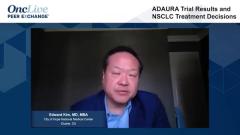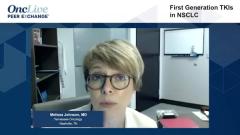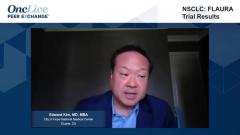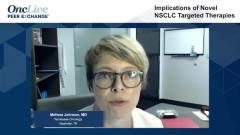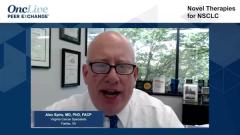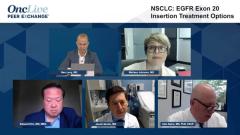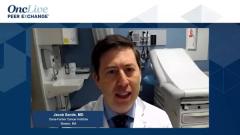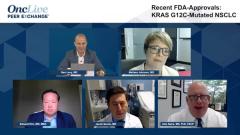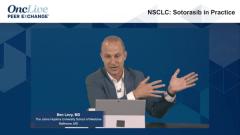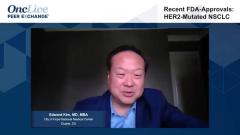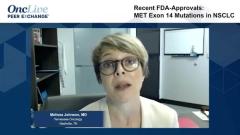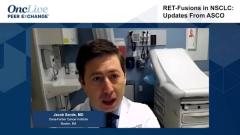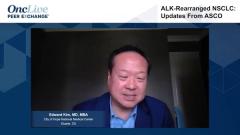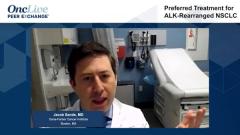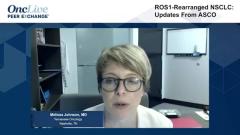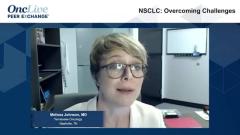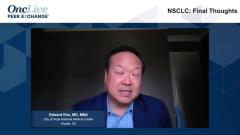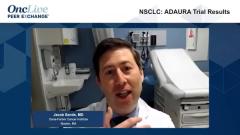
Implications of Novel NSCLC Targeted Therapies
An expert in non–small cell lung cancer (NSCLC) provides an overview of recent data presented at the American Society of Clinical Oncology 2021 annual meeting to treat MET exon 14 mutations.
Episodes in this series

Ben Levy, MD: Other thoughts from the panel? Jacob, your thoughts on these 2 presentations?
Jacob Sands, MD: I agree, this is exciting. One of the things, an initial look at it can be like, “Oh, a response rate of 30% to 40%,” which when we’re used to these targeted therapies, we’re used to much higher numbers and these amazing waterfall plots. But when you remember the backdrop of using a second-line chemotherapy and a response rate being around 20%, we’re beating that by a pretty substantial amount, and these are generally well tolerated. I’ll also make the statement, underlining what Alex said, these antibody-drug conjugates, as a class, are an exciting class of drugs, even beyond what he’s overviewed here. There are multiple others, which is exciting. It speaks to how much is going on within lung cancer treatment now.
Ben Levy, MD: Let’s say these drugs get approval in the next 6 to 12 months, what do we do until then? Melissa, in your everyday practice, what are you doing for your patients who have disease progression on osimertinib? Are you getting a liquid biopsy, tissue biopsy? Are you putting them on a study? Is there a role for chemotherapy in these patients?
Melissa Johnson, MD: Yes, absolutely there is. Now, the amivantamab plus lazertinib data set, those patients had not had platinum when they went on, whereas all the patients in the patritumab deruxtecan data set had had platinum as required for protocol. I ran up against it many times. Chemotherapy works for patients with EGFR mutations. I’ll say that what bubbled up about both of those data sets for me is the wide range of mechanisms of resistance. Unlike when we were using erlotinib, and we were doing plasma-based testing looking for T790M, hoping we would find it, this is a different arena or landscape we’re in now. I do use plasma post-OSI [osimertinib] to figure out what the mechanisms of resistance are. In the past it was to find MET, and that would push me, by the way now, toward amivantamab because we assume there will be an approval in that space. But there are a number of mechanisms. They are very varied, and that’s one of the reasons we can use chemotherapy for now. And these 2 drugs, I would anticipate an approval for both, and you’ll be able to use both in all-comers with resistance to OSI [osimertinib].
Ben Levy, MD: Ed, your parting shots on this, with these 2 abstracts. Which one do you like? Do you favor potentially using one over the other depending on what you’ve seen?
Edward Kim, MD, MBA: No, the more the merrier. We need options. It’s great to have options. And as clinicians, will see which ones we like. Let’s have more approvals, let’s bring them to the clinic, and it will sort itself out, just like in other places. I love that there are drugs like this in combinations. I echo what Jacob is talking about. Again, breast cancer was first, but now we’re bringing them in closer.
Alex Spira, MD, PhD, FACP: You’re not going to be able to decide what to give them. You’re going to have chemotherapy and multiple different options in this situation, and we’re going to be having this debate in a year, which one do you give next?
Ben Levy, MD: It’s a win for patients to have this many options.
TRANSCRIPT EDITED OR CLARITY


